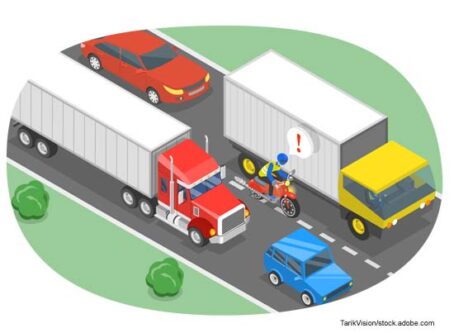Trucking research group launches survey to identify barriers for women joining the industry
A trucking research group hopes a new survey can help to pinpoint some of the challenges facing women when it comes to joining the industry.
On Wednesday, Jan. 3, the American Transportation Research Institute launched the survey to identify what both female and male truck drivers believe to be the barriers to entry for female truck drivers. The survey is open to all current and former CDL holders.
The survey will ask drivers for their perspectives and experiences:
- When considering a career as a truck driver
- While obtaining their CDL
- Regarding challenges encountered as a truck driver
- For those who no longer drive a truck, why they left the industry
“The research will also capture other challenges that truck drivers encounter while training, on the road and at parking facilities,” ATRI said in a statement. “The research will utilize responses from both (female) and (male) drivers to identify and contrast the unique challenges faced by (female) drivers.”
According to data from the U.S. Department of Transportation, women account for only 24% of all transportation and warehousing jobs, despite making up around 47% of the country’s workforce. When it comes to those behind the wheel, that number is even lower, with women representing only 6.6% of all drivers.
ATRI said the research – which was identified as a top priority by its Research Advisory Committee – aims to address workforce shortages and safety concerns for female drivers and to identify steps the industry can take to increase the percentage of female drivers.
Truckers will have until Feb. 2 to complete the confidential, online survey here.
Women of Trucking Advisory Board
As part of the 2021 bipartisan infrastructure law, Congress mandated the creation of the Women of Trucking Advisory Board to give FMCSA perspective on barriers to recruiting and retaining female drivers in the industry.
The 15-member board held its first meeting in November 2022, meeting five other times over the course of a year. With its last meeting in the books, a subcommittee has prepared the board’s final report to be submitted to FMCSA.
The agency now has one year to deliver its own report to Congress detailing the findings of the board, along with “any actions taken by the Administrator to adopt the recommendations, or an explanation of the reasons for not adopting the recommendations.”
Key points of the Women of Trucking Advisory Board’s “Essential Statements” include:
- As the industry evolves, elevate women’s voices in the commercial motor vehicle industry
- Bring diverse women’s CMV organizations and associations to the decision-making table
- Increase women’s representation on governmental advisory boards and other stakeholder engagement efforts related to the CMV industry
- Review and research the potential for an industry exemption from FLSA to determine the degree to which the lack of FLSA applicability to trucking is a barrier for women to become drivers, making it hard to support their families and earn a fair wage with basic protections
- Recognize, promote and encourage women to join all aspects of the transportation industry
- Collaborate with the motor coach industry and the broader CMV industry to facilitate opportunities for women
- Create a centralized web-based platform for women and associations in the industry
- Encourage the Department of Transportation and Department of Labor to communicate through diverse methods trucking’s essential role in the American economy, so that its status is reflected in support from state and local governments
- Educate men on the challenges faced by women in the industry and encourage them to become allies for women in the industry
During the board’s last meeting, FMCSA Administrator Robin Hutcheson said the board’s work “inspired me to – when I have the bully pulpit – speak with honesty and speak truth to the issues that you’ve raised.”
“This is recruitment. This is retention. This is the training that women need to stay in the industry,” Hutcheson said. “It’s a key point of your discussion, and we are laser-focused on it: What can we do from the seats that we are sitting in? I’ve heard you loud and clear that you need my voice, and I intend to use it for as long as I can from the seat that I’m in.” LL









